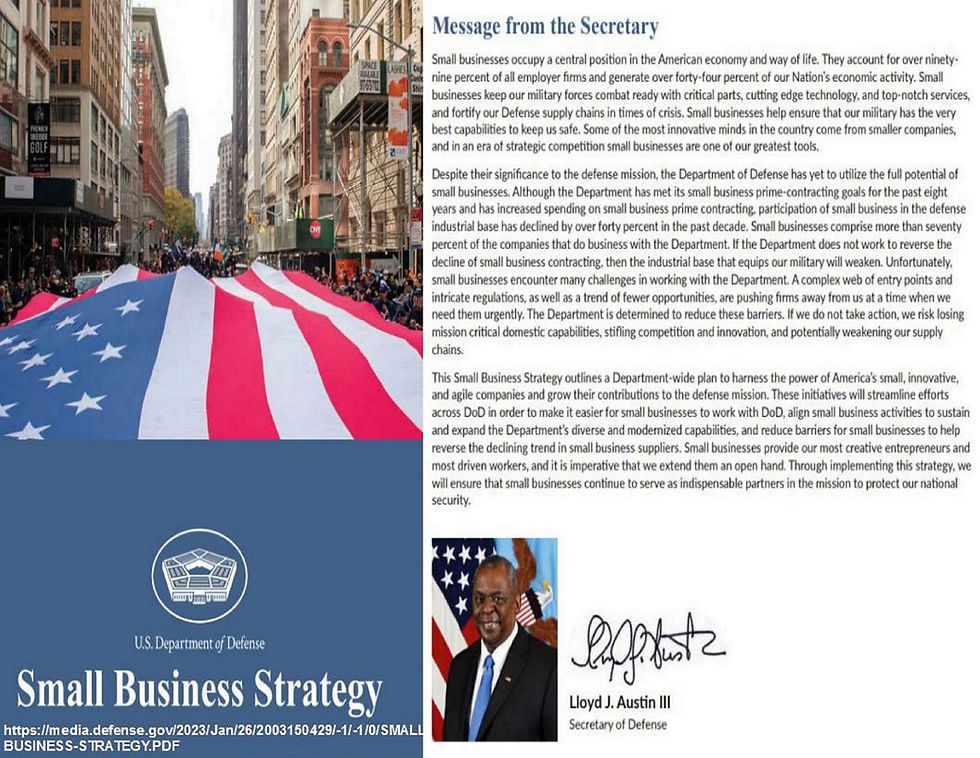How the Government Can Improve Access to Small Businesses
- Ken Larson

- Feb 20, 2023
- 3 min read

PLEASE CLICK ABOVE IMAGE TO ENLARGE
“HIGHERGOV.COM”
“There are a number of relatively simple steps the government can take to level the playing field for small businesses while simultaneously increasing transparency and the quality of contracted services.”
____________________________________________________________________________
“Publish All Federal Opportunities Publicly
Many government contract opportunities are never widely publicly released because they are only made available to holders of contract vehicles. Publishing the intention to offer a solicitation on a limited basis would enable smaller companies and new contractors to notify government contracting officers of their ability to perform the work, potentially encouraging wider solicitation when appropriate. It would also enable smaller contractors to more easily identify opportunities where they could act as a subcontractor.
Improve Quality of Small Business Contract Forecasts
Under the Business Opportunity Development Reform Act of 1988, government agencies are required to compile and make available forecasts of small business contracting opportunities. Compliance with the spirit of this Act varies widely – while some agencies such the General Services Administration and Department of Homeland Security have strong systems in place and make an effort to provide advanced notice of contracting opportunities, many agencies (particularly within the Department of Defense), only release forecasted opportunities sporadically, and with not nearly enough information to be useful for contractors.
Earlier and higher quality forecasts enable small businesses that do not have developed networks and relationships more time to prepare for solicitations and develop strong teams.
Improve Measurement of Small Business Goals
While the current annual SBA Scorecard is a useful tool, there is clear grade inflation with only one agency receiving a C grade and two agencies receiving a B (versus 21 A or A+) in the 2021 report despite the continual decline in number of small businesses winning contracts. Making the small business targets more ambitious, and adding additional metrics to the scorecard including how easy it is for first time contractors to win contracts, the diversity of work being performed by small businesses (NAICS), the geographic diversity of awards, and the quality of forecasts and solicitations would greatly improve the usefulness of the scorecard.
Minimize Contract Bundling, Add Vehicle On-Ramps
Contract bundling is the combination of multiple contracts or requirements into a single contract. Contract bundling has the potential to benefit the government as larger contracts can be cheaper to award and administer for both the government and contractors. However, bundling often puts contracts at a size and complexity where it is not feasible for small businesses to win. Rule changes to further limit bundling to cases where there is the strongest benefit to the government may in the long-term benefit both the government and the contractor ecosystem.
Moreover, adding on-ramps to contracting vehicles could also greatly benefit new companies in the government market that often have to wait up to five years for contracting vehicles to recompete to gain access.
Expand Special Programs and Small Business Outreach Resources
Congress has historically funded a number of programs specifically to support the small business community. This includes the recently reauthorized Small Business Innovation Research / Small Business Technology Transfer (SBIR/STTR) program, Mentor-Protégé programs, and Defense Research and Development (R&D) Rapid Innovation Program (RIF) (not currently funded). The Department of Defense also sponsors APEX Accelerators (recently rebranded from Procurement Technical Assistance Centers (PTACs)), which can help new government contractors navigate the complexities of government contracting. Increasing funding and support to these programs can directly help the government achieve its small business goals.
Execute the DoD Small Business Strategy
The Department of Defense recently released its highly anticipated Small Business Strategy, which contains a number of strategic objectives to strengthen small business contracting. Many of the objectives in the report would be wisely adopted by civilian agencies and supported by Congress where necessary. While agencies have the ability to make some improvements on their own, others will require Congressional action to bolster funding or make legal changes.”




Comments